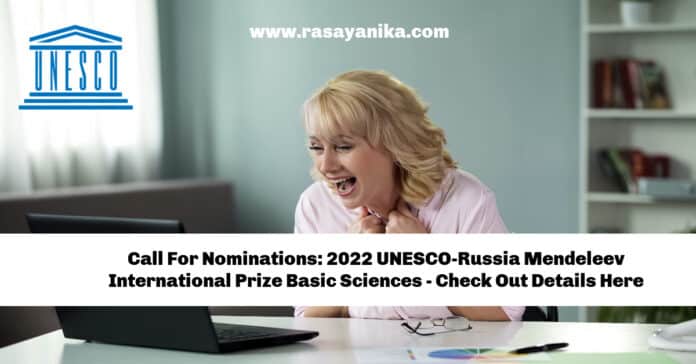Govt UNESCO-Russia Mendeleev International Prize Basic Sciences
UNESCO Headquarters, Paris has Call for application for the Call for nominations for the 2022 UNESCO-Russia Mendeleev International Prize in the Basic Sciences.
Motive: The Prize aims to promote and honor the basic sciences, defined to include the disciplines of chemistry, physics, mathematics, and biology, and as providing the foundation on which scientific knowledge can be propagated and which are fundamental to the advancement of innovation and sustainable development.
The proposed Prize contributes to generating scientific research, technology, and innovation, as well as pushing the production and application of scientific knowledge to the center of societal and economic development, in line with the United Nations 2030 Agenda for Sustainable Development.
The Prize aims to recognize and reward achievements that are conducive to socio-economic transformation and development on a regional or global scale, based on:
excellence in research in the basic sciences fields;
(ii) basic sciences education and popularization; international or regional cooperation in the basic sciences.
Conditions/qualifications of candidates
The candidates shall have earned recognition for their significant achievement/contribution to: research in the basic sciences in the form of a published communication,
(ii) basic sciences education and dissemination;
(iii) International or regional cooperation
in the basic sciences.Prizes may be conferred upon two individuals only who have promoted basic sciences advancement in education, research or international cooperation for societal transformation.
- The Prize has the ambition to be gender transformative in the sense that candidatures of women scientists will be encouraged, through the network of the International Basic Sciences Programme (IBSP), category 2 centers, UNESCO Chairs in science, International Scientific Unions and Universities, in line with UNESCO’s Global Priority on Gender Equality. The objective of the Prize is in conformity with UNESCO’s policies and is related to the Programme of the Organization in the field of the sciences, including the basic sciences, technology and innovation and knowledge for sustainable development
- The Prize intends to serve as a lever for strengthening global capabilities in science, as well as highlighting role models capable of attracting youth into basic sciences studies and careers, and empowering them in the fields of chemistry, physics, mathematics, and biology.
- The Prize represents above all an enduring legacy of the International Year of the Periodic Table of Chemical Elements led by UNESCO, with a lasting awareness and appreciation of the basic sciences and their fundamental role for providing solutions to development challenges in the implementation of the United Nations 2030 Agenda for Sustainable Development.
- The Prize is named after Dmitri Mendeleev whose life and career imbedded the three components of research and education, cooperation, and scientific and technological knowledge dissemination, which are reflected in the criteria of attribution of the Prize, giving it a unique value.
- The proposed Prize complies with the Revised Overall Strategy for UNESCO Prizes as adopted by the Executive Board.
The designation, periodicity, geographical distribution and amount of the Prize
- The Prize shall be entitled ‘UNESCO-Russia Mendeleev International Prize in the Basic Sciences”.
- The Prize shall be funded by the Government of the Russian Federation, and shall consist of a recurrent payment of USD 850,000 per year for its six-year period (2020-2025), which shall cover both the monetary value of the Prize and the costs of administering the Prize. A gold medal and a diploma will be given to each of the recipients. Any interest that may accrue shall be added to the overall contribution.
- All funds received and the interest accrued thereon shall be kept in a special interest-bearing account for the Prize (see financial regulations in Annex Il).
- The full staff support and operating/management costs of the Prize, including all costs related to the administration and public information activities, and the overhead costs to be applied and charged against the funds in the special account, estimated at USD 350,000 shall be fully covered by the Russian Federation. The related special account is to be established under the financial regulations for the Prize.
- The Prize shall be awarded every year to two individual prize-winners at each edition, on an initial basis for three biennia (six editions of the Prize in total).
- The Award Ceremony of the Prize should be organized through in-kind contributions from the Russian Federation. All costs of the Award Ceremony will be the responsibility of the Russian Federation.
Procedure for the awarding of the Prize
- The Prize shall be awarded by the Director-General or his/her representative at an official ceremony held for that purpose in alternation at UNESCO’s premises at Headquarters (whenever possible during the General Conference or the Executive Board) and in the Russian Federation. In the extraordinary case where this is not possible, UNESCO shall choose a suitable place in any member state of UNESCO for the award ceremony. UNESCO shall present to the prize-winners a financial award of USD 500,000 as well as a gold medal and a diploma. UNESCO shall officially announce the names of the prize-winners and highlight their achievements.
- If work being rewarded has been produced by several persons, the prize shall be awarded to the principal authors/contributors. In no case may a prize amount be divided between more than two persons.
- The prize-winners, if possible, shall give a lecture on a subject relevant to the achievement for which the prize has been awarded. Such a lecture shall be organized during or in connection with the Prize ceremony.
- The work produced by a person since deceased shall not be considered for a prize. If, however, a prize-winner dies before he has received the prize, then the prize may be presented posthumously.
- Should a prize-winner decline the prize, the jury shall submit a new proposal to the DirectorGeneral.
Designation/selection of Prize-winners
The prize-winners shall be selected by the Director-General of UNESCO on the basis of the assessments and recommendations made to him/her by an international Jury. Particular attention should be given to women candidates.
Nominations should be forwarded to the Indian National Commission for Cooperation with UNESCO (INCCU) latest by 28 th February 2022 at the following address for further consideration and onward transmission to UNESCO Headquarters, Paris, France.
Mr. Saroj Kumar Choudhary
Under Secretary to the Government of India
Ministry of Education
Department of Higher Education Room No. 203-A ‘C’ Wing
Dr. Rajendra Prasad Road
Shastri Bhavan,New Delhi — 110001
Contact No.: +91-011- 2338 4442
E-mail: inc.edu@nic.in
Editors Note: Govt UNESCO-Russia Mendeleev prize, Govt UNESCO-Russia Mendeleev Govt UNESCO-Russia Mendeleev Subscribe to Rasayanika for the latest chemistry and Pharma job openings, follow us on Facebook and Telegram and subscribe to our youtube channel for the latest updates on chemistry and Pharma jobs and much more.



















































